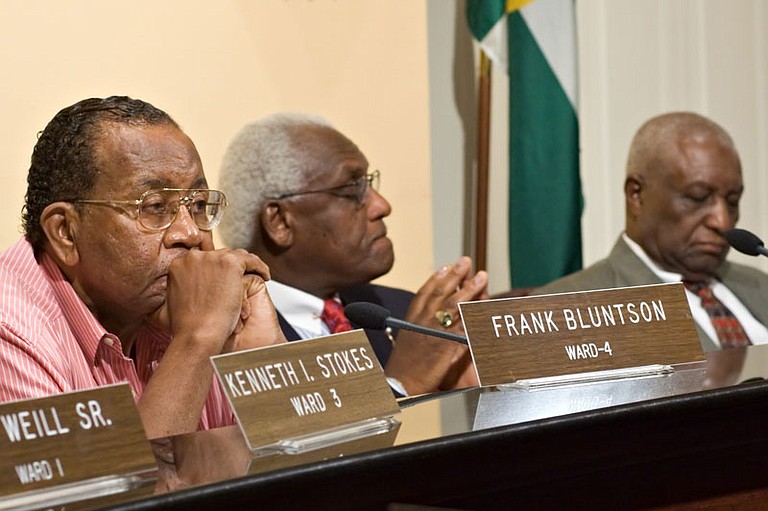The Jackson City Council is having a hard time finding money for pay raises this year. Pictured from left: Frank Bluntson and Leslie McLemore. Kenya Hudson
Wednesday, September 10, 2008
The Jackson City Council is mulling more budget cuts this week following news of shortfalls.
The $354 million city budget proposal includes almost $2 million for a city employee pay raise, including $600-per-year raise for non-sworn employees and $1,200 for sworn employees, such as police officers. The budget also reserves $600,000 for a summer youth employment program, a $500,000 tax reduction and a $1.5 million reduction in the city's bus-line budget.
The council immediately wrote off the tax decrease last week, which would have cost the city almost $600,000, especially in light of city employees' demands for pay increases.
Even Jackson Mayor Frank Melton acknowledged the bad timing of the tax decrease, admitting that he put a higher priority on police and employee pay raises.
The employee pay raises may also fall to the wayside, however.
The city council wants to provide raises to city employees, but council members argue that high costs are making the budget too tight to provide raises without a subsequent tax increase.
AFL-CIO union organizer Brenda Scott defended the raise, describing city wages as stagnant compared to rising costs of food and fuel.
"It's the capital city, and I think it's time we treat it like the capital city. Everybody wants to come in and work, and in the evening leave out of here without leaving a dime for infrastructure or anything else," Scott said, adding that she was a Jackson resident who would be willing to accept a tax increase to support the raise. "I'll take whatever is necessary. I understand Madison or Ridgeland may be considering raising their own taxes. What makes them any better than us?"
Jackson Police Chief Malcolm McMillin warned the council that the $1,200 raise for police officers wasn't really enough to offset the city's abnormally high attrition rate, as police move off to better paying, easier jobs in other cities or counties.
Melton went on the offensive over the raises last week, bitterly reminding the council that he had advocated for a city employee pay raise during the last budget cycle.
"Last year, this administration asked for a 20 percent increase for public safety and ... our support staff, but we were denied that by our council," Melton said. "This year, there's a greater sentiment to set things right because this is a political year."
Ward 6 Councilman Marshand Crisler defended his reasons for not accepting the increase.
"Last year we did have an opportunity to raise salaries, but the fact of the matter is the only way we could have done it was to raise taxes 2.5 mils or float a bonda thirty-year bondand I want to be clear that I did not approve that," Crisler said. "Most of us won't be here in 30 years. Of all the council members up here, by the grace of God and good health, I might be here by the end of it. I'm not entering into any agreement that I won't see ... completed."
The possibility of funding police and employee wages with a tax increase is also not likely, however, thanks to a county tax increase and a state law limiting combined tax increases to 10 percent.
Council members also want more money going to street repair.
Melton's budget proposal sets aside about $1 million for street resurfacing, but council members argue that the condition of city streets is so bad that it impacts the tax base, with prospective businesses actually weighing in on miserable road conditions before locating within the city.
"Surely some of our residents spend more money on annual vehicle repairs because of the condition of our roads," Council President Leslie McLemore added.
Public Works Director Thelmon Boyd warned the council repeatedly over the last few months that ignoring developing potholes for too long aggravates repair costs as the deterioration works its way down to the underlying layer of concrete beneath the asphalt. Boyd estimates the city needs about $70 million to get roads in tolerably working order, as well as another $10 million annually for maintenance.
Council members say the city's "seventy-year-plan" to repair city streets would outlast their lifetimes. The council instead advocates tripling the street repair budget and cutting some of Melton's pet projects, such as the teen summer job programby at least $400,000and possibly removing the $81,000 position Melton set aside for former police chief Shirlene Anderson, as the city's emergency coordinator.
Melton dangled the threat of a veto if the council pursued some of those objectives, but Crisler warned that the Sept. 15 deadline to approve the proposed budget is coming fast.
"Time is of the essence," said Crisler. "The deadline is approaching fast.

Comments
Use the comment form below to begin a discussion about this content.
Sign in to comment
Or login with:
OpenID